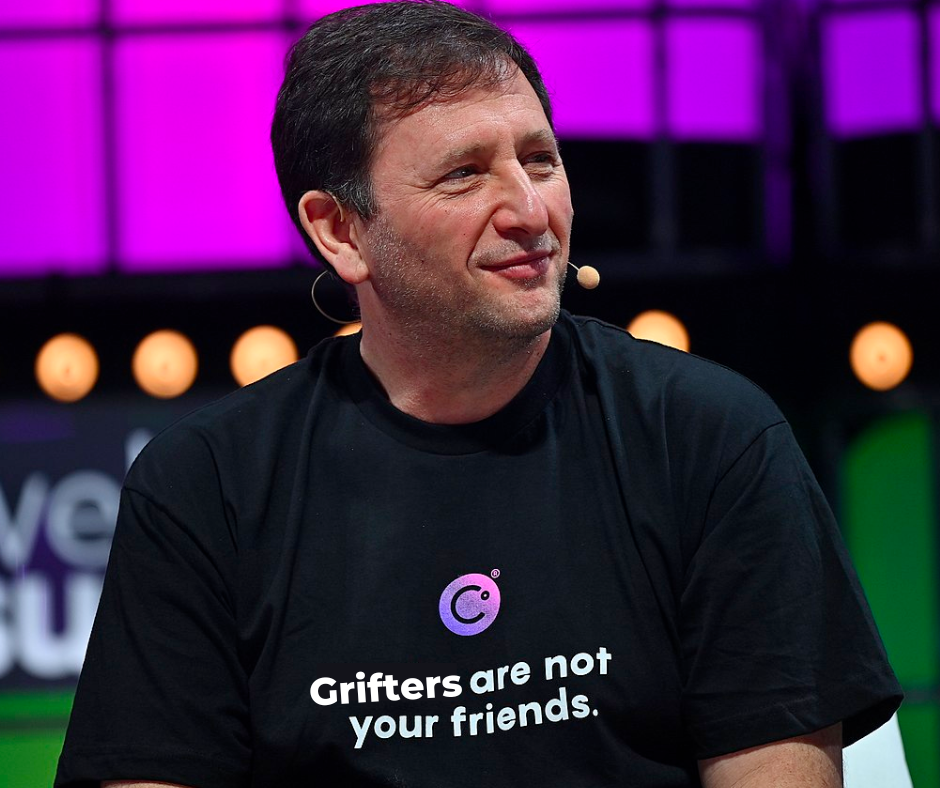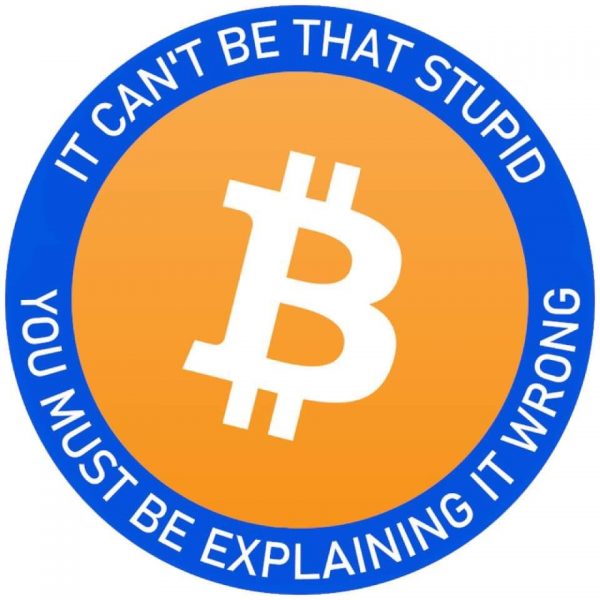
Tap to view at full size.

CoreX Legal is a Tampa-based law firm whose lawyers operate in the intersection of law and technology, and they’re holding an online seminar with the intriguing title Useful AI Tools and How to Use (or Tolerate) Them in Your Business. It’s happening this Thursday, July 20th at 12:00 p.m., and you can register (it’s free) here.
Here’s their writeup of the event:
The advent of the widespread use of artificial intelligence tools has occasioned significant legal and ethical concerns on many fronts. Notably, it seems likely that many uses of artificial intelligence involve rampant copyright infringement. Further, use of these tools can give rise to confidentiality, privacy, and security concerns.
Should governments regulate AI? Should companies enact policies regarding employee use of AI? What are the risks for people just trying to keep up with the latest technology.
Who the f**k knows, but this webinar will try to figure it all out … and give you own tools to navigate the rocky AI landscape in your business.

Here’s the “official unofficial” list of tech, entrepreneur, and nerd events for Tampa Bay and surrounding areas for the week of Monday, July 17 through Sunday, July 23, 2023.
| Group | Event Name | Time |
|---|---|---|
| Win a Job Fast • Tampa, FL | Job Search Acceleration Group (JSAG) Workshop (Zoom Passcode = 123456) | Mon, Jul 17 · 9:00 AM EDT |
| Win a Job Fast • Tampa, FL | Job Search Acceleration Group (JSAG) Workshop | Mon, Jul 17 · 9:00 AM EDT |
| Hyperledger Tampa • Tampa, FL | Blockchain Explorer – Blockchain Network Monitoring Utility | Mon, Jul 17 · 11:00 AM EDT |
| Young Professionals Networking JOIN in and Connect! • Saint Petersburg, FL | In person at Fords Garage St Pete | Mon, Jul 17 · 11:00 AM EDT |
| Tampa Bay Networking and Events • Largo, FL | Networking at Ford’s Garage | Mon, Jul 17 · 11:00 AM EDT |
| Tampa / St Pete Business Connections • Tampa, FL | Downtown St Pete Business Professionals Lunch | Mon, Jul 17 · 11:00 AM EDT |
| Tampa Bay Networking and Events • Largo, FL | Networking at Ford’s Garage | Mon, Jul 17 · 11:00 AM EDT |
| Tampa Bay Business Networking Meetings & Mixers • Tampa, FL | Monday Business Introductions at Romi’s Taco’s | Mon, Jul 17 · 11:30 AM EDT |
| Young Professionals Networking JOIN in and Connect! • Saint Petersburg, FL | Start the Week with more connections MONDAYS at Romi’s Tacos All Welcome! | Mon, Jul 17 · 11:30 AM EDT |
| Tampa Bay Networking and Events • Largo, FL | Networking at Cafe’ Delanie | Mon, Jul 17 · 11:30 AM EDT |
| Christian Professionals Network Tampa Bay • Largo, FL | Business Networking Meeting | Mon, Jul 17 · 11:30 AM EDT |
| Tampa Bay Business Networking Meetings & Mixers • Tampa, FL | Monday Business Introductions at Romi’s Taco’s | Mon, Jul 17 · 11:30 AM EDT |
| Christian Professionals Network Tampa Bay • Largo, FL | Business Networking Meeting | Mon, Jul 17 · 11:30 AM EDT |
| Young Professionals Networking JOIN in and Connect! • Saint Petersburg, FL | Start the Week with more connections MONDAYS at Romi’s Tacos All Welcome! | Mon, Jul 17 · 11:30 AM EDT |
| Professional Business Networking with RGAnetwork.net • Tampa, FL | St. Pete Networking Lunch! Fords Garage! Monday’s | Mon, Jul 17 · 11:30 AM EDT |
| Tampa Startup Founder 101 • Tampa, FL | Reverse Engineering The Venture Capital Investment Decision | Mon, Jul 17 · 1:00 PM EDT |
| Orlandopreneur • Orlando, FL | Orlandopreneur Monthly Happy Hour | Mon, Jul 17 · 5:30 PM EDT |
| Tampa Game Nights • Tampa, FL | Karaoke Night at Felicitous | Mon, Jul 17 · 5:30 PM EDT |
| Win a Job Fast • Tampa, FL | Job Search Acceleration Group (JSAG) Workshop | Mon, Jul 17 · 6:00 PM EDT |
| Toastmasters, Division D • Altamonte Springs, FL | ACE Advanced Toastmasters 3274480 | Mon, Jul 17 · 6:00 PM EDT |
| Tampa Bay Tabletoppers • Tampa, FL | Monday Feast & Game Night | Mon, Jul 17 · 6:00 PM EDT |
| Critical Hit Games • Saint Petersburg, FL | MTG: Commander Night | Mon, Jul 17 · 6:00 PM EDT |
| Tampa Bay Gaming: RPG’s, Board Games & more! • Tampa, FL | Casual Pokemon League at Nerdy Needs | Mon, Jul 17 · 6:00 PM EDT |
| Board Game Meetup: Board Game Boxcar • Orlando, FL | Monday Weekly Board Game Night! (Lazy Moon Colonial Location) | Mon, Jul 17 · 6:00 PM EDT |
| Brews N Board Games • Orlando, FL | Board Game Night at Persimmon Hollow Flamingo Crossings | Mon, Jul 17 · 6:00 PM EDT |
| Free Thinkers Dinner Club • Tampa, FL | Dinner and lively conversation at Casa Ludovico in Palm Harbor | Mon, Jul 17 · 6:30 PM EDT |
| Shut Up & Write!® Orlando • Orlando, FL | Shut Up & Write!® Dr. Phillips/Orlando | Mon, Jul 17 · 6:30 PM EDT |
| Ironhack Tampa – Tech Careers, Learning and Networking • Tampa, FL | Learn the Basics of Python Programming from an Industry Expert 📊 | Mon, Jul 17 · 7:00 PM EDT |
| Beginning Web Development • Windermere, FL | Weekly Meetup | Mon, Jul 17 · 7:00 PM EDT |
| Tampa Hackerspace • Tampa, FL | Woodshop Tool Sign Off-Jointer, Planer, & Bandsaw (Members Only) | Mon, Jul 17 · 7:00 PM EDT |
| Toastmasters Division E • Orlando, FL | Lakeland (FL) Toastmasters Club #2262 | Mon, Jul 17 · 7:00 PM EDT |
| Learn-To-Trade Crypto (Online) • Maitland, FL | Learn-To-Trade Stocks, Forex, Crypto, Options & Futures (YouTube LiveStream) | Mon, Jul 17 · 7:00 PM EDT |
| Toastmasters Division G • Ocala, FL | Spanglish Toastmasters Club 7703731 | Mon, Jul 17 · 7:00 PM EDT |
| Saint Petersburg Ladies book club • Saint Petersburg, FL | St. Pete Women’s Book Club | Mon, Jul 17 · 7:00 PM EDT |
| Light Study PRO – A Photography Workshop for Emerging Pros • Miami, FL | Members as far back as 2008 can access their photos | Mon, Jul 17 · 7:00 PM EDT |
| Library Book Clubs – OCLS • Orlando, FL | Virtual Event: Hiawassee Book Club | Mon, Jul 17 · 7:00 PM EDT |
| Sunshine Games • Tampa, FL | DigiMondays | Mon, Jul 17 · 7:30 PM EDT |
| Defcon813 • Tampa, FL | Seminole Heights Social | Mon, Jul 17 · 8:00 PM EDT |
| Defcon813 • Tampa, FL | Seminole Heights Social | Mon, Jul 17 · 8:00 PM EDT |
| Bitcoiners of Southwest Florida • Fort Myers, FL | Where is Bitcoin Going? | Mon, Jul 17 · 9:00 PM EDT |
| Return to the top of the list |
On Tuesday morning, Computer Coach (via the Front End Creatives, Tech Success Network, Career Success Academy, and Tampa Cybersecurity Training meetups) will host an online session on the Applicant Tracking Systems (ATS) and how to write your resume so that the ATS doesn’t work against you. Find out more and register here.

On Tuesday evening, the Tampa Bay SQL Server User Group will hold their July meeting. Find out more and register here.
WordPress Tampa Bay is also having a meetup Tuesday evening, where you can workshop projects and problems. Find out more and register here.
Hardware skills are rarer than software skills, and the Electronics Meetup — which is free — at Tampa Hackerspace can give you an edge! Find out more and register here.
| Group | Event Name | Time |
|---|---|---|
| Tampa Bay Agile • Tampa, FL | v-Lean Coffee | Tue, Jul 18 · 7:30 AM EDT |
| Network Professionals Inc. of South Pinellas (NPI) • Saint Petersburg, FL | NPI St. Pete Business Builders Chapter – Exchange Qualified Business Referrals | Tue, Jul 18 · 7:30 AM EDT |
| Front End Creatives • Tampa, FL | How to Beat the Applicant Tracking System (ATS) | Tue, Jul 18 · 10:00 AM EDT |
| Career Success Academy • Tampa, FL | How to Beat the Applicant Tracking System (ATS) | Tue, Jul 18 · 10:00 AM EDT |
| Tampa Cybersecurity Training • Tampa, FL | How to Beat the Applicant Tracking System (ATS) | Tue, Jul 18 · 10:00 AM EDT |
| Tech Success Network • Tampa, FL | How to Beat the Applicant Tracking System (ATS) | Tue, Jul 18 · 10:00 AM EDT |
| Florida Startup: Idea to IPO • Tampa, FL | How to Find Product Market Fit Quickly | Tue, Jul 18 · 11:00 AM EDT |
| Business Professionals of Pinellas, Pasco & Hillsborough • Largo, FL | Tuesday Westchase Business Networking Lunch at Grand Hacienda | Tue, Jul 18 · 11:00 AM EDT |
| Tampa Bay Networking and Events • Largo, FL | Networking at SeaGlass Tavern~ All Welcome, join us!!! | Tue, Jul 18 · 11:00 AM EDT |
| Young Professionals Networking JOIN in and Connect! • Saint Petersburg, FL | Westchase Professional Business Networking Lunch ~ All Welcome | Tue, Jul 18 · 11:00 AM EDT |
| Tampa / St Pete Business Connections • Tampa, FL | Westchase Business Networking Lunch ~ All Welcome JOIN us and connect! | Tue, Jul 18 · 11:00 AM EDT |
| Tampa Bay Networking and Events • Largo, FL | Networking at SeaGlass Tavern~ All Welcome, join us!!! | Tue, Jul 18 · 11:00 AM EDT |
| Business Professionals of Pinellas, Pasco & Hillsborough • Largo, FL | Tuesday Westchase Business Networking Lunch at Grand Hacienda | Tue, Jul 18 · 11:00 AM EDT |
| Young Professionals Networking JOIN in and Connect! • Saint Petersburg, FL | Westchase Professional Business Networking Lunch ~ All Welcome | Tue, Jul 18 · 11:00 AM EDT |
| Tampa Bay Business Networking Meetings & Mixers • Tampa, FL | Westchase Networking Lunch -Grand Hacienda~ Meet your next referral | Tue, Jul 18 · 11:00 AM EDT |
| Wesley Chapel, Trinity, New Tampa, Business Professionals • Wesley Chapel, FL | New Tampa Networking Lunch at Glory Day’s Grill New Tampa | Tue, Jul 18 · 11:30 AM EDT |
| Tampa Bay Networking and Events • Largo, FL | Networking at Glory Days Grill | Tue, Jul 18 · 11:30 AM EDT |
| Tampa Bay Networking and Events • Largo, FL | Networking at Italian Touch, St. Pete | Tue, Jul 18 · 11:30 AM EDT |
| Pasco County Young Entrepreneurs/Business Owners All Welcome • Wesley Chapel, FL | Professional Business Networking Lunch Glory Day’s New Tampa | Tue, Jul 18 · 11:30 AM EDT |
| Professional Business Networking with RGAnetwork.net • Tampa, FL | Westchase Professionals Business Networking Lunch -Grand Hacienda 11955 Sheldon | Tue, Jul 18 · 11:30 AM EDT |
| Pasco County Young Entrepreneurs/Business Owners All Welcome • Wesley Chapel, FL | Professional Business Networking Lunch Glory Day’s New Tampa | Tue, Jul 18 · 11:30 AM EDT |
| Wesley Chapel, Trinity, New Tampa, Business Professionals • Wesley Chapel, FL | New Tampa Networking Lunch at Glory Day’s Grill New Tampa | Tue, Jul 18 · 11:30 AM EDT |
| SWAT Networking – Successful Women Aligning Together • Bradenton, FL | SWAT Networking Bradenton Luncheon | Tue, Jul 18 · 11:30 AM EDT |
| Hyperledger Tampa • Tampa, FL | Running Hyperledger Aries in the Browser with Hyperledger AnonCreds | Tue, Jul 18 · 12:00 PM EDT |
| Simply Referrals Tampa Business Networking • Tampa, FL | The Business Networking Midday Power Hour by Simply Referrals on Zoom! | Tue, Jul 18 · 12:00 PM EDT |
| Manatee River Business Exchange Club • Ellenton, FL | Great group for referrals – Several new members – WE are growing!!! | Tue, Jul 18 · 12:00 PM EDT |
| Network After Work Tampa – Networking Events • Tampa, FL | How to Maximize AI Virtual Summit | Tue, Jul 18 · 1:00 PM EDT |
| Tampa Hackerspace • Tampa, FL | Weekly Open Make Night | Tue, Jul 18 · 6:00 PM EDT |
| Tampa Bay SQL Server User Group (TBSSUG) • Clearwater, FL | TBSSUG Monthly Meeting | Tue, Jul 18 · 6:00 PM EDT |
| Tampa Hackerspace • Tampa, FL | Weekly Open Make Night | Tue, Jul 18 · 6:00 PM EDT |
| St. Petersburg Business Networking Pick-up Basketball • Saint Petersburg, FL | Weekly pickup networking basketball | Tue, Jul 18 · 6:00 PM EDT |
| Nerdbrew Events • Tampa, FL | Spookeasy MtG Ybor Tuesdays! | Tue, Jul 18 · 6:00 PM EDT |
| Critical Hit Games • Saint Petersburg, FL | Hobby Night | Tue, Jul 18 · 6:00 PM EDT |
| Nerd Night Out • Tampa, FL | SpookEasy Kava Bar MtG Night | Tue, Jul 18 · 6:00 PM EDT |
| WordPress Tampa Bay • Tampa, FL | Ask Us Anything: WordPress Support Crowdsourcing Meetup | Tue, Jul 18 · 6:30 PM EDT |
| West Pasco Toastmasters Club #2824 • New Port Richey, FL | Weekly Meeting | Tue, Jul 18 · 6:30 PM EDT |
| Saint Petersburg Book Club Meetup Group • Saint Petersburg, FL | July Saint Petersburg Meetup Book Club | Tue, Jul 18 · 6:30 PM EDT |
| Pinellas Writers • Largo, FL | Weekly Group Meetings – All Writers Welcome! | Tue, Jul 18 · 6:30 PM EDT |
| Shut Up & Write!® Orlando • Orlando, FL | Shut Up & Write!® in Altamonte Springs/Lake Mary | Tue, Jul 18 · 6:30 PM EDT |
| Tampa Hackerspace • Tampa, FL | Electronics Meetup | Tue, Jul 18 · 7:00 PM EDT |
| Ironhack Orlando – Tech Careers, Learning and Networking • Orlando, FL | The basics of Data Analytics 📈 | Tue, Jul 18 · 7:00 PM EDT |
| Tampa Entrepreneurs Network • Tampa, FL | Get Clients in Record Time with LinkedIn with Dr. Dumont Owen | Tue, Jul 18 · 7:00 PM EDT |
| Tampa Hackerspace • Tampa, FL | Electronics Meetup | Tue, Jul 18 · 7:00 PM EDT |
| Sunshine Games • Tampa, FL | Yu-Gi-Oh Evening Tournament | Tue, Jul 18 · 7:00 PM EDT |
| St. Pete Beers ‘n Board Games for Young Adults • Saint Petersburg, FL | St. Pete Beers ‘n Board Games Meetup for Young Adults | Tue, Jul 18 · 7:00 PM EDT |
| Tampa – Sarasota – Venice Trivia & Quiz Meetup • Bradenton, FL | Trivia Night – Moose Lodge 2117 Smartphone Trivia Game Show | Tue, Jul 18 · 7:00 PM EDT |
| Tampa Bay Gaming: RPG’s, Board Games & more! • Tampa, FL | D&D Adventurers League at Armada Games | Tue, Jul 18 · 7:00 PM EDT |
| Suncoast Gamers • Sarasota, FL | Dems with Dice | Tue, Jul 18 · 7:00 PM EDT |
| Florida Center for Creative Photography • Saint Petersburg, FL | AMA – Ask Me Anything Related to Photography, Computers and Software | Tue, Jul 18 · 7:00 PM EDT |
| Star Trek Chapter in Orlando, Florida • Orlando, FL | USS Haven Weekly Strange New Worlds Watch Party | Tue, Jul 18 · 7:00 PM EDT |
| Literate Ladies of Orlando…Well Bred…Well Read • Orlando, FL | The Mythmakers for July | Tue, Jul 18 · 7:00 PM EDT |
| Tampa Bay Coalition of Reason • Tampa, FL | Online: Tampa Bay Technology Center (TBTC) Monthly Meeting | Tue, Jul 18 · 7:00 PM EDT |
| TB Chess – Tampa Bay – St. Petersburg Chess Meetup Group • Saint Petersburg, FL | Let’s play chess at 54th Ave Kava House! | Tue, Jul 18 · 7:30 PM EDT |
| Shut Up & Write!® Tampa • Tampa, FL | Online Event: Shut Up & Write on Zoom | Tue, Jul 18 · 7:45 PM EDT |
| Bitcoiners of Southwest Florida • Fort Myers, FL | Trading Tuesday | Tue, Jul 18 · 8:00 PM EDT |
| Return to the top of the list |
On Wednesday evening, Data Analytics Tampa Bay’s topic will be Exploratory and Explanatory Data Analysis: from raw data to data-driven business decisions, with speaker Alan Ferrandiz Langley from Tampa consulting company Core Analitica. Find out more and register here.
| Group | Event Name | Time |
|---|---|---|
| Tampa Bay Networking and Events • Largo, FL | Networking at The Hanger Restaurant & Flight Lounge! | Wed, Jul 19 · 7:30 AM EDT |
| Young Professionals Networking JOIN in and Connect! • Saint Petersburg, FL | St Pete Networking Breakfast at the Hangar Meet St Pete’s Top Pro’s All Weclcome | Wed, Jul 19 · 7:30 AM EDT |
| Tampa Bay Business Networking Meetings & Mixers • Tampa, FL | DOWNTOWN ST PETE YOUNG NETWORKING PROFESSIONALS BREAKFAST AT THE HANGAR! | Wed, Jul 19 · 7:30 AM EDT |
| Professional Business Networking with RGAnetwork.net • Tampa, FL | Downtown St Pete Professionals Networking Breakfast | Wed, Jul 19 · 7:30 AM EDT |
| Network Professionals Inc. of South Pinellas (NPI) • Saint Petersburg, FL | NPI Profit Partners Chapter – Exchange Qualified Business Referrals | Wed, Jul 19 · 7:30 AM EDT |
| Data, Cloud and AI in Tampa • Tampa, FL | How to Prepare for the EU AI Act by Innovating and Creating AI Responsibly | Wed, Jul 19 · 8:00 AM EDT |
| 1 Million Cups – Orlando • Winter Park, FL | 1 Million Cups – Orlando Weekly Meetup | Wed, Jul 19 · 8:30 AM EDT |
| Tampa Bay AWS User Group • Tampa, FL | AWS Customer Day: Event Driven Architectures | Wed, Jul 19 · 9:00 AM EDT |
| Tampa Bay AWS User Group • Tampa, FL | AWS Customer Day: Event Driven Architectures | Wed, Jul 19 · 9:00 AM EDT |
| Suncoast Drone Club • Tampa, FL | Cunningham Park | Wed, Jul 19 · 9:00 AM EDT |
| Data, Cloud and AI in Tampa • Tampa, FL | Seize the AI Advantage: Discover WatsonX, IBM’s Generative AI Platform | Wed, Jul 19 · 10:00 AM EDT |
| Suncoast Credit Union Micro Enterprise Development Meetup • Tampa, FL | Business Banking and Financing with SBDC Hillsborough County | Wed, Jul 19 · 10:00 AM EDT |
| Orlando Cybersecurity Meetup • Orlando, FL | The Science of Data Loss Prevention | Wed, Jul 19 · 11:00 AM EDT |
| Tampa / St Pete Business Connections • Tampa, FL | Brandon Business Professionals IN Person!!!! | Wed, Jul 19 · 11:30 AM EDT |
| Young Professionals Networking JOIN in and Connect! • Saint Petersburg, FL | Brandon Business Professionals Just Love Coffee | Wed, Jul 19 · 11:30 AM EDT |
| Tampa Bay Networking and Events • Largo, FL | Networking at Just Love Coffee! | Wed, Jul 19 · 11:30 AM EDT |
| Tampa Bay Networking Meetings and Mixers • Tampa, FL | Carrollwood Networking Lunch! Join us and win! | Wed, Jul 19 · 11:30 AM EDT |
| Tampa Bay Networking and Events • Largo, FL | Networking at Glory Days Grill! | Wed, Jul 19 · 11:30 AM EDT |
| Tampa / St Pete Business Connections • Tampa, FL | Brandon Business Professionals IN Person!!!! | Wed, Jul 19 · 11:30 AM EDT |
| Bradenton/Sarasota Networking Meetings and Mixers • Sarasota, FL | Business Networking Lunch | Wed, Jul 19 · 11:30 AM EDT |
| Young Professionals Networking JOIN in and Connect! • Saint Petersburg, FL | Brandon Business Professionals Just Love Coffee | Wed, Jul 19 · 11:30 AM EDT |
| Tampa Startup Founder 101 • Tampa, FL | Co-Founder Networking: Find a Business Partner Online | Wed, Jul 19 · 1:00 PM EDT |
| Tampa Cybersecurity Meetup | Flatiron School • Tampa, FL | Cyber Essentials | Securing the Future: AI and Password Security – Virtual | Wed, Jul 19 · 1:00 PM EDT |
| Learn Cybersecurity Tampa | Flatiron School • Tampa, FL | Cyber Essentials | Securing the Future: AI and Password Security – Virtual | Wed, Jul 19 · 1:00 PM EDT |
| Tampa Cybersecurity Meetup | Flatiron School • Tampa, FL | Cyber 101 | Info Session | Flatiron School | Wed, Jul 19 · 2:00 PM EDT |
| Network After Work Tampa – Networking Events • Tampa, FL | Small Business Owners Q&A Session | Wed, Jul 19 · 2:00 PM EDT |
| Learn Cybersecurity Tampa | Flatiron School • Tampa, FL | Cyber 101 | Info Session | Flatiron School | Wed, Jul 19 · 2:00 PM EDT |
| Florida Startup: Idea to IPO • Tampa, FL | FREE WEBINAR: How to Outsource Development of Your App | Wed, Jul 19 · 5:00 PM EDT |
| Brandon Boardgamers • Brandon, FL | Board Gaming – In Person | Wed, Jul 19 · 5:00 PM EDT |
| Tampa Blockchain Meetup Group • Tampa, FL | Taking Advantage of the Digital Money Revolution | Wed, Jul 19 · 5:30 PM EDT |
| Sarasota Business Exchange Club • Sarasota, FL | We ARE meeting again at Rusty Bucket Restaurant | Wed, Jul 19 · 5:30 PM EDT |
| Tampa Gaming Guild • Tampa, FL | Wednesday Board Game Night | Wed, Jul 19 · 5:30 PM EDT |
| Data Analytics – Tampa Bay • Tampa, FL | Data Analytics – Tampa Bay – JULY MEETUP | Wed, Jul 19 · 6:00 PM EDT |
| Win a Job Fast • Tampa, FL | Job Search Acceleration Group (JSAG) Workshop | Wed, Jul 19 · 6:00 PM EDT |
| DigitalDeLand • Deland, FL | Digital DeLand Monthly Meeting | Wed, Jul 19 · 6:00 PM EDT |
| Win a Job Fast • Tampa, FL | Job Search Acceleration Group (JSAG) Workshop | Wed, Jul 19 · 6:00 PM EDT |
| Sunshine Games • Tampa, FL | Casual Commander Wednesdays | Wed, Jul 19 · 6:00 PM EDT |
| The Tampa Chapter of the Society for the Exploration of Play • Tampa, FL | Critical Hit Games: Board Game Night | Wed, Jul 19 · 6:00 PM EDT |
| Critical Hit Games • Saint Petersburg, FL | Board Game Night | Wed, Jul 19 · 6:00 PM EDT |
| Nerdbrew Events • Tampa, FL | Games & Grog @ Felicitous! | Wed, Jul 19 · 6:00 PM EDT |
| Clermont Nerd Games • Clermont, FL | Dungeons & Dragons One Shot Wednesdays | Wed, Jul 19 · 6:00 PM EDT |
| Orlando D and D 5th Edition custom scenarios or campaigns • Orlando, FL | D&D 5e Savage Frontiers | Wed, Jul 19 · 6:00 PM EDT |
| Meeple Movers Gaming Group • Ocala, FL | Dominion with Dennis | Wed, Jul 19 · 6:00 PM EDT |
| Brews N Board Games • Orlando, FL | Board Game Night at Deadwords Brewing | Wed, Jul 19 · 6:00 PM EDT |
| Prose Society Writers’ Group • Saint Petersburg, FL | Monthly Meeting: How to Trust In Your Reader by Showing, Not Telling – Part II | Wed, Jul 19 · 6:00 PM EDT |
| Drunk’n Meeples the Social Tabletop (Board) Gamers • Palm Harbor, FL | Game Night! | Wed, Jul 19 · 6:30 PM EDT |
| The Weirder Things Book Club • Parrish, FL | Verity – midway point | Wed, Jul 19 · 6:30 PM EDT |
| Tampa Hackerspace • Tampa, FL | 3D Printing Orientation: Models and Slicers | Wed, Jul 19 · 7:00 PM EDT |
| Defcon813 • Tampa, FL | CigarCitySec | Wed, Jul 19 · 7:00 PM EDT |
| Tampa Amazon Seller Meetup Group • Tampa, FL | Why A Product Launch Can Fail | Wed, Jul 19 · 7:00 PM EDT |
| Central Florida CitySec • Orlando, FL | CigarCitySec Meetup | Wed, Jul 19 · 7:00 PM EDT |
| Tampa Bay Bitcoin • Tampa, FL | Bitcoin Social | Wed, Jul 19 · 7:00 PM EDT |
| Defcon813 • Tampa, FL | CigarCitySec | Wed, Jul 19 · 7:00 PM EDT |
| Central Florida CitySec • Orlando, FL | CigarCitySec Meetup | Wed, Jul 19 · 7:00 PM EDT |
| Tampa Hackerspace • Tampa, FL | 3D Printing Orientation: Models and Slicers | Wed, Jul 19 · 7:00 PM EDT |
| YouTuber Meetup – Orlando • Orlando, FL | YouTuber Meetup – Orlando – Meet and Greet, 15 Jul 2023, 07:00 PM | Wed, Jul 19 · 7:00 PM EDT |
| Tampa Amazon Seller Meetup Group • Tampa, FL | Why A Product Launch Can Fail | Wed, Jul 19 · 7:00 PM EDT |
| Geekocracy! • Tampa, FL | Geek Book Club: Looking for Alaska (at Olive Garden) | Wed, Jul 19 · 7:00 PM EDT |
| Castaways Euchre Club • Saint Petersburg, FL | Castaways Euchre Club | Wed, Jul 19 · 7:00 PM EDT |
| Tampa Bay Gaming: RPG’s, Board Games & more! • Tampa, FL | MtG Modern Constructed at Armada Games | Wed, Jul 19 · 7:00 PM EDT |
| Adventures On Tap: TTRPGs and Board Games • Orlando, FL | Nerd Night: Board Games and Beer at Deadwords Brewing | Wed, Jul 19 · 7:00 PM EDT |
| Zen City Brews Events and News • Tarpon Springs, FL | Spill the Tea & Book Club | Wed, Jul 19 · 7:00 PM EDT |
| Orlando Horror Movie Fans 20s-30s • Orlando, FL | TERRIFIER (2016) | Wed, Jul 19 · 7:00 PM EDT |
| Central Florida AD&D (1st ed.) Grognards Guild • Winter Park, FL | New Beginnings & Old Rivalries | Wed, Jul 19 · 7:00 PM EDT |
| Nerd Night Out • Tampa, FL | Game Night @ Felicitous on 42nd by USF | Wed, Jul 19 · 7:00 PM EDT |
| Professionals Meetup For Networking And Social Skillsets • Orlando, FL | How to Express Yourself and Connect with People | Wed, Jul 19 · 7:00 PM EDT |
| Women In Linux • Tampa, FL | Understanding Linux | Wed, Jul 19 · 8:00 PM EDT |
| Return to the top of the list |
On Thursday at noon, CoreX Legal, Tampa Bay’s most tech-savvy law firm, is holding an online seminar: Useful AI Tools and How to Use (or Tolerate) Them in Your Business. Find out more and register here.
Also on Thursday at noon: Computer Coach (via the Front End Creatives, Career Success Academy, Tampa Cybersecurity Training, and Tech Success Network meetups) is hosting an online seminar: Showcasing Your Skills in a Technical Interview. Find out more and register here.
Thursday evening will have some in-person events such as Tampa Bay Lean Beer, which is happening on the Tampa side of the bay. Find out more and register here.
| Group | Event Name | Time |
|---|---|---|
| Wesley Chapel, Trinity, New Tampa, Business Professionals • Wesley Chapel, FL | Business Over Breakfast ~ Happy Hangar IN PERSON JOIN US! | Thu, Jul 20 · 7:30 AM EDT |
| Pasco County Young Entrepreneurs/Business Owners All Welcome • Wesley Chapel, FL | Happy Hangar Early Bird Professionals Networking | Thu, Jul 20 · 7:30 AM EDT |
| Tampa Bay Networking and Events • Largo, FL | LUTZ, FL – HAPPY HANGER CAFE THURSDAY NETWORKING | Thu, Jul 20 · 8:00 AM EDT |
| Professional Alliance – Local Networking Group • Orlando, FL | Professional Alliance – Local Networking Meeting | Thu, Jul 20 · 8:00 AM EDT |
| Clearwater Entrepreneurs’ Round Table • Dunedin, FL | Entrepreneur Roundtable to SPARK Ideas & Build Growth | Thu, Jul 20 · 8:30 AM EDT |
| Pinellas Park Summer Event Group Teens and Pre Teens • Pinellas Park, FL | Family And Youth Beginner Tennis | Thu, Jul 20 · 8:30 AM EDT |
| USBH Business Networking • Port Richey, FL | USBH Business Networking | Thu, Jul 20 · 9:00 AM EDT |
| Florida Startup: Idea to IPO • Tampa, FL | How to Cut Product Development Costs by up to 50%! | Thu, Jul 20 · 11:00 AM EDT |
| Business Professionals of Pinellas, Pasco & Hillsborough • Largo, FL | Clearwater Professional Networking Lunch | Thu, Jul 20 · 11:00 AM EDT |
| Young Professionals Networking JOIN in and Connect! • Saint Petersburg, FL | The Founders Meeting where it all Began! JOIN us! Bring a guest and get a gift | Thu, Jul 20 · 11:00 AM EDT |
| Tampa Bay Networking and Events • Largo, FL | Pinellas County’s Largest Networking Lunch and your invited! | Thu, Jul 20 · 11:00 AM EDT |
| Tampa / St Pete Business Connections • Tampa, FL | Clearwater/Central Pinellas Networking Lunch JOIN us and connect your business | Thu, Jul 20 · 11:00 AM EDT |
| PowerGals: St Pete Daytime Lunch + Mingle • Saint Petersburg, FL | Power Gals of St Pete Daytime Lunch + Mingle! w/ SPECIAL GUEST! | Thu, Jul 20 · 11:00 AM EDT |
| Business Professionals of Pinellas, Pasco & Hillsborough • Largo, FL | Clearwater Professional Networking Lunch | Thu, Jul 20 · 11:00 AM EDT |
| Tampa Bay Business Networking Happy Hour/Meetings/Meet Up • Clearwater, FL | Pinellas County’s Largest Networking Lunch and your invited! | Thu, Jul 20 · 11:00 AM EDT |
| Wesley Chapel, Trinity, New Tampa, Business Professionals • Wesley Chapel, FL | Wesley Chapel Professional Networking Lunch | Thu, Jul 20 · 11:30 AM EDT |
| Pasco County Young Entrepreneurs/Business Owners All Welcome • Wesley Chapel, FL | Lutz / Wesley Chapel Professional Networking Lunch at Bahama Breeze! | Thu, Jul 20 · 11:30 AM EDT |
| Professional Business Networking with RGAnetwork.net • Tampa, FL | Breakroom Bar & Grill 11:28 Doors open at 11:00am IN Person | Thu, Jul 20 · 11:30 AM EDT |
| Wesley Chapel, Trinity, New Tampa, Business Professionals • Wesley Chapel, FL | Wesley Chapel Professional Networking Lunch | Thu, Jul 20 · 11:30 AM EDT |
| CoreX Legal | Useful AI Tools and How to Use (or Tolerate) Them in Your Business | Thu, Jul 20 · 12:00 PM EDT |
| Front End Creatives • Tampa, FL | Showcasing Your Skills in a Technical Interview | Thu, Jul 20 · 12:00 PM EDT |
| Simply Referrals Tampa Business Networking • Tampa, FL | The Business Networking Midday Power Hour by Simply Referrals on Zoom! | Thu, Jul 20 · 12:00 PM EDT |
| Tampa Cybersecurity Training • Tampa, FL | Showcasing Your Skills in a Technical Interview | Thu, Jul 20 · 12:00 PM EDT |
| Career Success Academy • Tampa, FL | Showcasing Your Skills in a Technical Interview | Thu, Jul 20 · 12:00 PM EDT |
| Tampa Business Referral Networking Group • Tampa, FL | Tampa Business Networking Group | Thu, Jul 20 · 12:00 PM EDT |
| Tech Success Network • Tampa, FL | Showcasing Your Skills in a Technical Interview | Thu, Jul 20 · 12:00 PM EDT |
| Tampa Business Referral Networking Group • Tampa, FL | Tampa Business Networking Group | Thu, Jul 20 · 12:00 PM EDT |
| Tampa Startup Founder 101 • Tampa, FL | How to Leverage Generative AI for Your Work | Thu, Jul 20 · 1:00 PM EDT |
| Tampa Bay Gaming: RPG’s, Board Games & more! • Tampa, FL | Commander Open Play Night at Armada Games | Thu, Jul 20 · 1:00 PM EDT |
| Orlando Cybersecurity Meetup • Orlando, FL | All about cyber insurance: Learn to implement important security controls. | Thu, Jul 20 · 2:00 PM EDT |
| Meeple Movers Gaming Group • Ocala, FL | Pathfinder Society at Meeple Movers | Thu, Jul 20 · 2:00 PM EDT |
| Network After Work Tampa – Networking Events • Tampa, FL | Posting4Profit | Thu, Jul 20 · 3:00 PM EDT |
| Data, Cloud and AI in Tampa • Tampa, FL | How to Prepare for the EU AI Act by Innovating and Creating AI Responsibly | Thu, Jul 20 · 3:30 PM EDT |
| Tampa Professional Networking Meetup • Tampa, FL | Happy Hour Networking – Cigars, Fine Wines and Brews | Thu, Jul 20 · 5:00 PM EDT |
| Gulfport Scrabblers and Social • Saint Petersburg, FL | Gulfport Scrabble and Social | Thu, Jul 20 · 5:00 PM EDT |
| Ironhack Tampa – Tech Careers, Learning and Networking • Tampa, FL | The Basics of Web Development | Thu, Jul 20 · 6:00 PM EDT |
| Network After Work Tampa – Networking Events • Tampa, FL | Virtual Cocktails and Connections | Thu, Jul 20 · 6:00 PM EDT |
| Bitcoin Key Club • Sarasota, FL | Monthly Meetup: Scott and Tali Lindberg | Thu, Jul 20 · 6:00 PM EDT |
| Tarpon Springs Pop Culture & Gaming Meetup • Tarpon Springs, FL | Third Thursday Board Game Meetup | Thu, Jul 20 · 6:00 PM EDT |
| Brandon and Seffner area AD&D and OSR Group • Seffner, FL | 1st ed. AD&D Campaign. | Thu, Jul 20 · 6:00 PM EDT |
| Critical Hit Games • Saint Petersburg, FL | Warhammer Night | Thu, Jul 20 · 6:00 PM EDT |
| Magic the Gathering Tampa/Brandon/St Pete • Tampa, FL | Nerdy Needs (Casual Thursday Commander Night) | Thu, Jul 20 · 6:00 PM EDT |
| Orlando Board Gaming Weekly Meetup • Orlando, FL | Central Florida Board Gaming at The Collective | Thu, Jul 20 · 6:00 PM EDT |
| Southwest Florida Board Game Meetup • Cape Coral, FL | Meetup to Play Board Games | Thu, Jul 20 · 6:00 PM EDT |
| We Write Here Black and Women of Color Writing Group • Tampa, FL | Weekday Writing Get Down | Thu, Jul 20 · 6:00 PM EDT |
| Tampa Bay Agile • Tampa, FL | Lean Beer for All Things Agile (Tampa) | Thu, Jul 20 · 6:30 PM EDT |
| ONETUG – Orlando .NET User Group • Orlando, FL | The Dangers of ChatGPT | Thu, Jul 20 · 6:30 PM EDT |
| Tampa Free Writing Group • Tampa, FL | Writing Meetup | Thu, Jul 20 · 6:30 PM EDT |
| Tampa Hackerspace • Tampa, FL | 3D Printer Orientation: Printing at Tampa Hackerspace (THS Members only) | Thu, Jul 20 · 7:00 PM EDT |
| IIBA Tampa Bay • Tampa, FL | BABOK IIBA Tampa Bay Study Group | Thu, Jul 20 · 7:00 PM EDT |
| Tampa Hackerspace • Tampa, FL | 3D Printer Orientation: Printing at Tampa Hackerspace (THS Members only) | Thu, Jul 20 · 7:00 PM EDT |
| Sunshine Games • Tampa, FL | One Piece Thursdays | Thu, Jul 20 · 7:00 PM EDT |
| Nerdbrew Events • Tampa, FL | FOWL PLAY @ Gangchu! | Thu, Jul 20 · 7:00 PM EDT |
| Balance Martial Arts and Gaming • Pinellas Park, FL | Yu-Gi-Oh Tournament | Thu, Jul 20 · 7:00 PM EDT |
| Tampa – Sarasota – Venice Trivia & Quiz Meetup • Bradenton, FL | Smartphone Trivia Game Show at Wilders Pizza | Thu, Jul 20 · 7:00 PM EDT |
| TB Chess – Tampa Bay – St. Petersburg Chess Meetup Group • Saint Petersburg, FL | Thursday chess at 54th Ave Kava House! | Thu, Jul 20 · 7:00 PM EDT |
| Live streaming production and talent • Tarpon Springs, FL | Live streaming production and talent | Thu, Jul 20 · 7:00 PM EDT |
| Books & Brews! • Largo, FL | One Off – Hyperion by Dan Simmons – book discussion | Thu, Jul 20 · 7:00 PM EDT |
| Nerd Night Out • Tampa, FL | Seminole Heights Thurs Game Night @ Gangchu! | Thu, Jul 20 · 7:00 PM EDT |
| Plant City Web Development Group • Plant City, FL | Weekly Meetup | Thu, Jul 20 · 8:00 PM EDT |
| Return to the top of the list |
| Group | Event Name | Time |
|---|---|---|
| Winter Park Toastmasters – Learn while having FUN! • Winter Park, FL | Improve your communication, listening, and leadership skills | Fri, Jul 21 · 7:15 AM EDT |
| Brandon Biz Pros • Brandon, FL | Build your Business with Brandon Biz Pros | Fri, Jul 21 · 8:30 AM EDT |
| Young Professionals Networking JOIN in and Connect! • Saint Petersburg, FL | Tampa Young Professionals Virtual Networking Friday Morning All WElCOME | Fri, Jul 21 · 8:45 AM EDT |
| Professional Business Networking with RGAnetwork.net • Tampa, FL | A.C.T. Acquire Connections Today Morning Business Networking All Welcome! | Fri, Jul 21 · 8:45 AM EDT |
| Young Professionals Networking JOIN in and Connect! • Saint Petersburg, FL | Tampa Young Professionals Virtual Networking Friday Morning All WElCOME | Fri, Jul 21 · 8:45 AM EDT |
| Professional Business Networking with RGAnetwork.net • Tampa, FL | FBI ~ Friday Business Introductions at Largo Family Restaurant | Fri, Jul 21 · 9:00 AM EDT |
| Tampa Bay Networking Meetings and Mixers • Tampa, FL | Business over Breakfast Clearwater | Fri, Jul 21 · 9:00 AM EDT |
| Tampa Bay Networking and Events • Largo, FL | Networking over breakfast | Fri, Jul 21 · 9:00 AM EDT |
| Project Codex • Orlando, FL | Virtual Coffee | Fri, Jul 21 · 9:00 AM EDT |
| Tampa Bay InfraGard Meetup Group • Tampa, FL | July Membership Meeting (Open to Anyone) | Fri, Jul 21 · 9:00 AM EDT |
| Tampa Bay InfraGard Meetup Group • Tampa, FL | July Membership Meeting (Open to Anyone) | Fri, Jul 21 · 9:00 AM EDT |
| Tampa Bay UX Group • Tampa, FL | TBUX Lite: Virtual Coffee Talk | Fri, Jul 21 · 9:00 AM EDT |
| Tampa Bay Networking and Events • Largo, FL | Networking over breakfast | Fri, Jul 21 · 9:00 AM EDT |
| Professional Business Networking with RGAnetwork.net • Tampa, FL | FBI ~ Friday Business Introductions at Largo Family Restaurant | Fri, Jul 21 · 9:00 AM EDT |
| Project Codex • Orlando, FL | Virtual Coffee | Fri, Jul 21 · 9:00 AM EDT |
| Christian Professionals Network Tampa Bay • Largo, FL | Improve Speaking Skills & Build Confidence | Fri, Jul 21 · 9:25 AM EDT |
| Business Professionals of Pinellas, Pasco & Hillsborough • Largo, FL | International Networking at McAlisters Deli every Friday | Fri, Jul 21 · 11:30 AM EDT |
| Tampa Bay Networking Meetings and Mixers • Tampa, FL | Friday Business Introductions Tampa | Fri, Jul 21 · 11:30 AM EDT |
| Tampa Bay Networking and Events • Largo, FL | Westshore Business Networking Lunch at McAlisters Deli Every Friday All Welcome | Fri, Jul 21 · 11:30 AM EDT |
| Tampa / St Pete Business Connections • Tampa, FL | International Professionals Networking Meeting | Fri, Jul 21 · 11:30 AM EDT |
| Tampa / St Pete Business Connections • Tampa, FL | International Professionals Networking Meeting | Fri, Jul 21 · 11:30 AM EDT |
| Business Professionals of Pinellas, Pasco & Hillsborough • Largo, FL | International Networking at McAlisters Deli every Friday | Fri, Jul 21 · 11:30 AM EDT |
| Tampa Bay Business Networking Happy Hour/Meetings/Meet Up • Clearwater, FL | International Networking Westshore McAlisters Deli | Fri, Jul 21 · 11:30 AM EDT |
| Tampa Bay Networking and Events • Largo, FL | Westshore Business Networking Lunch at McAlisters Deli Every Friday All Welcome | Fri, Jul 21 · 11:30 AM EDT |
| Brandon Boardgamers • Brandon, FL | WEEKLY FRIDAY NIGHT GAMING AT GAMER’S COMMAND | Fri, Jul 21 · 5:00 PM EDT |
| Clermont Nerd Games • Clermont, FL | Board Game Night! | Fri, Jul 21 · 5:00 PM EDT |
| Meeple Movers Gaming Group • Ocala, FL | Board Game Night at Meeple Movers Cafe | Fri, Jul 21 · 5:00 PM EDT |
| Tampa Gaming Guild • Tampa, FL | Friday Board Game Night | Fri, Jul 21 · 5:30 PM EDT |
| Tampa Bay Atlassian Community Events • Tampa, FL | Team Shaping – Mark Cruth, Modern Work Coach at Atlassian is coming to Tampa | Fri, Jul 21 · 6:00 PM EDT |
| Win a Job Fast • Tampa, FL | Job Search Acceleration Group (JSAG) Workshop | Fri, Jul 21 · 6:00 PM EDT |
| Tampa Bay Atlassian Community Events • Tampa, FL | Team Shaping – Mark Cruth, Modern Work Coach at Atlassian is coming to Tampa | Fri, Jul 21 · 6:00 PM EDT |
| Win a Job Fast • Tampa, FL | Job Search Acceleration Group (JSAG) Workshop | Fri, Jul 21 · 6:00 PM EDT |
| Critical Hit Games • Saint Petersburg, FL | MTG: Commander FNM | Fri, Jul 21 · 6:00 PM EDT |
| Dunnellon Area Board Gamers • Dunnellon, FL | Friday Night Board Gaming | Fri, Jul 21 · 6:00 PM EDT |
| Tampa Japanese Meetup • Tampa, FL | Nihongo De Okay | Fri, Jul 21 · 6:00 PM EDT |
| Nerd Night Out • Tampa, FL | Taps & Drafts | Fri, Jul 21 · 6:00 PM EDT |
| Self-Perfected Orlando • Orlando, FL | GROWTH MINDSET | Fri, Jul 21 · 6:00 PM EDT |
| MakerFX Makerspace • Orlando, FL | MakerFX Makerspace Woodshop Guild | Fri, Jul 21 · 7:00 PM EDT |
| Sunshine Games • Tampa, FL | Modern FNM | Fri, Jul 21 · 7:00 PM EDT |
| Oviedo Middle Aged Gamers (OMAG) • Oviedo, FL | Tabletop: Friday Board Game Night | Fri, Jul 21 · 7:00 PM EDT |
| Orlando Stoics • Altamonte Springs, FL | ONLINE: 365 Ways to be More Stoic (Finale) | Fri, Jul 21 · 7:00 PM EDT |
| ► Tampa Bay Young Professionals Group • Tampa, FL | Social in the covered Beer Garden of c.1949 | Fri, Jul 21 · 7:30 PM EDT |
| ► Tampa Bay Young Professionals Group • Tampa, FL | Social in the covered Beer Garden of c.1949 | Fri, Jul 21 · 7:30 PM EDT |
| Indica Cafe Events • Tampa, FL | Friday night game night | Fri, Jul 21 · 9:00 PM EDT |
| Tampa Bay Business Networking Meetings & Mixers • Tampa, FL | International Networking at McAlisters Deli every Friday | Fri, Jul 21 · 11:30 PM EDT |
| Florida Center for Creative Photography • Saint Petersburg, FL | Monthly Cell Phone Photo Showcase | Fri, Jul 21 · 11:59 PM EDT |
| Return to the top of the list |
Saturday morning, Tampa Bay Techies will be holding their July Study Meetup. Are you studying for a certification, school, or need to catch up on extra work? Do you need study buddies? You’ll want to catch this. Find out more and register here.
Also on Saturday morning: Google Developer Group Central Florida is hosting a virtual kickoff for the Google I/O Hackathon, where they’ll get into integrating machine learning and AI tools into web, Flutter, and mobile applications. Find out more and register here.
| Group | Event Name | Time |
|---|---|---|
| Central Florida Philosophy Meetup • Winter Park, FL | Wake Up and Think Clearly Saturday morning share and discuss. | Sat, Jul 22 · 7:00 AM EDT |
| Orlando Innovative Business Minds: Creative Strategy Meetup • Orlando, FL | Creative business minds & coffee | Sat, Jul 22 · 8:00 AM EDT |
| Toastmasters Division G • Ocala, FL | Early Bird Ocala | Sat, Jul 22 · 8:00 AM EDT |
| Florida Center for Creative Photography • Saint Petersburg, FL | FCCP – Introduction to Color Management for Photographers – Editing, Part 2/2 | Sat, Jul 22 · 9:00 AM EDT |
| Tampa Bay Techies • Tampa, FL | Tampa Bay Techies July Study Group | Sat, Jul 22 · 9:00 AM EDT |
| Florida Center for Creative Photography • Saint Petersburg, FL | FCCP – Introduction to Color Management for Photographers – Editing, Part 2/2 | Sat, Jul 22 · 9:00 AM EDT |
| Chess Republic • Tampa, FL | Saturday Chess at Wholefoods in Midtown, Tampa | Sat, Jul 22 · 9:30 AM EDT |
| ► Tampa Bay Young Professionals Group • Tampa, FL | Saturday in the 🌞 @ St. Pete Beach | Sat, Jul 22 · 9:30 AM EDT |
| Tampa Hackerspace • Tampa, FL | Wood Shop Lathe 101 (Members Only) | Sat, Jul 22 · 10:00 AM EDT |
| The Art Of Photography – Tampa/St. Pete Chapter • Tampa, FL | SAT 7/22 at 10 AM ONLINE PHOTOGRAPHY CRITIQUE PROGRAM | Sat, Jul 22 · 10:00 AM EDT |
| Tampa Hackerspace • Tampa, FL | Wood Shop Lathe 101 (Members Only) | Sat, Jul 22 · 10:00 AM EDT |
| Geekocracy! • Tampa, FL | Geeks Go Gecko For Reptiles, Then Food After | Sat, Jul 22 · 10:00 AM EDT |
| Tampa Bay Drone Club • Tampa, FL | Open Fly @ The Tower | Sat, Jul 22 · 10:30 AM EDT |
| Women In Linux • Tampa, FL | ATLANTA Meetup | Sat, Jul 22 · 11:00 AM EDT |
| Google Developer Group Central Florida • Orlando, FL | Google I/O Extended Hackathon: Web, Mobile, and AI Focus (Kick-off) | Sat, Jul 22 · 11:00 AM EDT |
| Gen Geek • Saint Petersburg, FL | Pinellas Bike Trail | Sat, Jul 22 · 11:00 AM EDT |
| Women In Linux • Tampa, FL | LIVE | Tech, Stocks & Jobs | Sat, Jul 22 · 12:00 PM EDT |
| Orlando Atlassian Community Events • Orlando, FL | Team Shaping – Mark Cruth, Modern Work Coach at Atlassian is coming to Orlando | Sat, Jul 22 · 12:00 PM EDT |
| Women’s Prosperity Network | Fort Lauderdale Chapter • Fort Lauderdale, FL | Online | VIRTUAL Mastermind Experience: Connecting, Creating & Collaborating | Sat, Jul 22 · 12:00 PM EDT |
| Tampa Bay Coalition of Reason • Tampa, FL | July- N. Pinellas Book Club | Sat, Jul 22 · 12:00 PM EDT |
| Suncoast Makers • Sarasota, FL | FREE Fab Lab Orientation | Sat, Jul 22 · 1:00 PM EDT |
| Space Coast Women’s Wine and Book Club • Merritt Island, FL | July Book Club: YA Book: The Grace Year by Kim Liggett | Sat, Jul 22 · 1:00 PM EDT |
| Meeple Movers Gaming Group • Ocala, FL | Dungeon Crawl Classics Day – with a 1-shot RPG Campaign with Ray | Sat, Jul 22 · 2:00 PM EDT |
| Women In Linux • Tampa, FL | Live | How We Linux | Sat, Jul 22 · 2:30 PM EDT |
| Tampa Bay Thinkers • Tampa, FL | Why are laws regressing? Do they reflect opinions of the majority of Americans? | Sat, Jul 22 · 4:00 PM EDT |
| Tampa D&D Enthusiasts • Tampa, FL | Legacy of Mana (5e campaign) | Sat, Jul 22 · 4:00 PM EDT |
| Tampa Bay Thinkers • Tampa, FL | Why are laws regressing? Do they reflect opinions of the majority of Americans? | Sat, Jul 22 · 4:00 PM EDT |
| Tampa Hackerspace • Tampa, FL | Tampa Hackerspace Board Game Night and Potluck | Sat, Jul 22 · 6:00 PM EDT |
| Tampa Hackerspace • Tampa, FL | Tampa Hackerspace Board Game Night and Potluck | Sat, Jul 22 · 6:00 PM EDT |
| Nerdbrew Events • Tampa, FL | Community Hang-out Night | Sat, Jul 22 · 6:00 PM EDT |
| Oviedo Middle Aged Gamers (OMAG) • Oviedo, FL | Golf Group – RPG One-Shots | Sat, Jul 22 · 6:30 PM EDT |
| Sunshine Games • Tampa, FL | Yu-Gi-Oh Evening Tournament | Sat, Jul 22 · 7:00 PM EDT |
| Balance Martial Arts and Gaming • Pinellas Park, FL | Yu-Gi-Oh Tournament | Sat, Jul 22 · 7:00 PM EDT |
| Suncoast Gamers • Sarasota, FL | Dems with Dice | Sat, Jul 22 · 7:00 PM EDT |
| Central Florida AD&D (1st ed.) Grognards Guild • Winter Park, FL | THE ONE-SHOT GUILD | Sat, Jul 22 · 7:00 PM EDT |
| SWFL Home Academy • Fort Myers, FL | First-Time Home Buyer’s Webinar | Sat, Jul 22 · 7:00 PM EDT |
| Nerd Night Out • Tampa, FL | Tampa Nerd Online Hang-out & Game Night! | Sat, Jul 22 · 7:00 PM EDT |
| Indica Cafe Events • Tampa, FL | Street Fighter 6 PS5 Competition Tournament | Sat, Jul 22 · 8:00 PM EDT |
| Black Entrepreneurs who Love Great Music & Networking • Tampa, FL | Riverview Live @ The TapHouse | Sat, Jul 22 · 9:00 PM EDT |
| Return to the top of the list |
| Group | Event Name | Time |
|---|---|---|
| Florida Center for Creative Photography • Saint Petersburg, FL | FCCP – Learn How to Shoot and Edit Photos for HDR | Sun, Jul 23 · 9:00 AM EDT |
| Soberish Hang Outs and Book Club • Tampa, FL | Discussing The Tools by Phil Stutz and Barry Michels | Sun, Jul 23 · 10:00 AM EDT |
| Suncoast Critical Thinking Discussion Group • Sarasota, FL | IHOP Restaurant CRITICAL THINKERS SUNDAY BRUNCH | Sun, Jul 23 · 10:00 AM EDT |
| Clermont Nerd Games • Clermont, FL | Warhammer 40K | Sun, Jul 23 · 11:00 AM EDT |
| Board Games and Card Games in Sarasota & Bradenton • Sarasota, FL | Venice Strategy Board Gamers | Sun, Jul 23 · 12:00 PM EDT |
| Brandon Boardgamers • Brandon, FL | 4TH SUNDAY OF THE MONTH BOARDGAMING AT NERDY NEEDS | Sun, Jul 23 · 1:00 PM EDT |
| Drunk’n Meeples West Pasco (Boardgames) • Port Richey, FL | Weekend Game Day | Sun, Jul 23 · 1:00 PM EDT |
| Tampa Bay Gaming: RPG’s, Board Games & more! • Tampa, FL | D&D Adventurers League at Critical Hit Games | Sun, Jul 23 · 2:00 PM EDT |
| Chess Republic • Tampa, FL | Sunday Chess at Grassroots Kava House in Ybor | Sun, Jul 23 · 2:00 PM EDT |
| Critical Hit Games • Saint Petersburg, FL | D&D Adventurers League | Sun, Jul 23 · 2:00 PM EDT |
| Tampa Bay Web3 Frens • Tampa, FL | Bitcoin 102 – Class 📝 then drinks! 🍻 | Sun, Jul 23 · 3:00 PM EDT |
| Sunshine Games • Tampa, FL | Sunday Pokemon League | Sun, Jul 23 · 4:00 PM EDT |
| Tampa Hackerspace • Tampa, FL | Sew Awesome! (Textile Arts & Crafts) | Sun, Jul 23 · 5:30 PM EDT |
| Brandon and Seffner area AD&D and OSR Group • Seffner, FL | Lankhmar: City of Adventure | Sun, Jul 23 · 5:30 PM EDT |
| Tampa Hackerspace • Tampa, FL | Let’s Learn to Turn Pens! | Sun, Jul 23 · 6:00 PM EDT |
| Toastmasters Division E • Orlando, FL | Find Your Funny Toastmaster | Sun, Jul 23 · 6:30 PM EDT |
| Unlucky Roll Cafe Board Game Meetup • Inverness, FL | Open Game Night | Sun, Jul 23 · 7:00 PM EDT |
| Saint Petersburg Ladies book club • Saint Petersburg, FL | St. Pete Women’s Book Club | Sun, Jul 23 · 7:00 PM EDT |
| Nerd Night Out • Tampa, FL | A Duck Presents NB Movie Night | Sun, Jul 23 · 7:00 PM EDT |
| Solana – Tampa • Tampa, FL | Office Hours | Sun, Jul 23 · 8:00 PM EDT |
| Nerdbrew Events • Tampa, FL | NerdBrew Karaoke @ MacDinton’s! | Sun, Jul 23 · 8:00 PM EDT |
| Enjoy the Crypto Space without the Roller Coaster • Cape Coral, FL | PAMM Account Overview Zoom | Sun, Jul 23 · 9:00 PM EDT |
| Return to the top of the list |
How do I put this list together? It’s largely automated. I have a collection of Python scripts in a Jupyter Notebook that scrape Meetup and Eventbrite for events in categories that I consider to be “tech,” “entrepreneur,” and “nerd.” The result is a checklist that I review. I make judgement calls and uncheck any items that I don’t think fit on this list.
In addition to events that my scripts find, I also manually add events when their organizers contact me with their details.
What goes into this list? I prefer to cast a wide net, so the list includes events that would be of interest to techies, nerds, and entrepreneurs. It includes (but isn’t limited to) events that fall under any of these categories:


It’s the top story on Techmeme right now: Celsius Network’s disgraced former CEO Alex Mashinsky has been arrested and charged with seven criminal counts including securities, commodities, and wire fraud. If convicted, Mashinsky could spend decades in prison. And as a former customer, I say: good.
Celsius, if you’re not familiar with it, was a cryptocurrency exchange that purported to operate like a bank, but better — starting with 1980s-style interest rates on crypto that you stored with them — until their business, which proved to be a Ponzi scheme, collapsed in 2022.
In June 2022, they filed for bankruptcy, but not before pausing withdrawals after its C-level people made big withdrawals themselves. It had been facing federal investigations, and during this process, they leaked half a million users’ holdings info via a data dump of its customers and their holdings.
There’s a Tampa Bay connection in the Celsius scandal: co-founder and former CTO Nuke Goldstein, who moved here in 2021 amid a lot of fanfare from local press including these two funny/sad-in-retrospect pieces from Tampa Bay Business Journal:
And let’s not forget how much love Celsius got at the 2021 edition of the Florida Bitcoin and Blockchain Summit, which featured a sold-out party where you could hang out with Goldstein. For more, see my article, If you’re going to Florida Bitcoin and Blockchain Summit 2022, YOU’RE AN IDIOT.
Goldstein’s name hasn’t appeared in any news items about Mashinsky’s arrest, but the smart play for him would be to distance himself from Celsius as much as possible. And he’s taking an approach used by many other shady crypto/Web3 carpetbaggers…

If you look at Goldstein’s Twitter feed, it’s all AI now. In fact, his insterest in AI is such that he joined a meetup I organize:
That’s right — he signed up. As organizer, I see who joined, and when.
I thought about revoking his membership, but you know what would be more entertaining? If he actually showed up to a meetup, just so we could have a little impromptu Q&A session.

The Tampa Bay Technology Leadership Association (TBTLA) held an “AI fireside chat” yesterday at the St. Petersburg Shuffleboard Club, and it was a well-attended event with a lot of discussion about the opportunities and challenges that generative AI presents. I was invited to be one of the panelists and enjoyed the get-together at one of St. Pete’s best (and underappreciated) venues.
Here are some photos from the start of the event, with everyone mingling:
First up were Mark Moskowitz, COO at CellPoint Digital and Kishen Sridharan from the Office of Technology Innovation at Raymond James, moderated by Anitra Pavka:
They were followed by Chad Hage, Senior Cloud Solution Architect at Microsoft and Amit Bharwani, Product Manager at PWC Labs and the AI Lab at PWC, with moderator Benjamin Allen:

Then came Yours Truly (Joey deVilla, Senior Developer Advocate at Okta) and Rahul Khanna, Cybersecurity Expert at Propensic Solutions. Once again Benjamin Allen moderated:
And finally, Keith Sartain, Director of IT at ConnectWise and Josh Nelson, Director of Technology Experience at Power Design, with Craig Laue moderating:
With the talks done, it was then time to take advantage of the venue and the lovely weather and play some shuffleboard!
My thanks to TBTLA for putting on a great event, and to my fellow speakers for providing solid insights and opinions!
Tampa Bay Technology Leadership Association’s (TBTLA) AI Fireside Chat happens tomorrow (Wednesday, July 12th, 2023) at 6:00 p.m. at St. Petersburg Shuffleboard Club, and I’ll be speaking there! It’s free to attend, and it’s not only a great way to learn more about AI, but also to socialize with local tech people and play some shuffleboard. Go ahead and register here.

Here are all the speakers:
For those of you who are planning to attend — or if you’re just curious — here are some questions and answers that should give you some useful background information for the fireside chat.
AI is short for artificial intelligence, a catch-all term for giving machines the ability to perform tasks that require intelligence — itself a catch-all term referring to the abilities of problem-solving, discernment, and judgment.
Generative AI is a broad category of AI whose purpose is to generate new content, which could be in the form of text, images, audio, video, code, and anything else we would classify as a “creative work” if it were made by a human. Here are a few examples:
Yes, and it’s used in more places than you might think. This kind of AI is often called discriminative AI, because it can discriminate between similar things. Some examples include:
It’s a combination of a number of things:

In AI, a model is the computer equivalent of a mental model you’d have in your mind — an understanding of some topic that allows you to find patterns and make predictions.
If you’ve lived in Florida for a little while, you’ve probably build a mental model about the weather. If you notice that the sky is cloudy and greenish-grey, the wind is increasingly gusty and picking up in speed, and the birds have suddenly become silent, your mental model will suggest to you that it’s time to seek shelter very, very soon. That’s because you’ve seen these signs before and have noticed that they generally appear shortly before a hurricane.
AI models are similar in that they allow computers to make predictions and choose courses of action based on the available evidence. An AI model for weather would compare the current conditions to the historical weather record that it was trained on, note the sudden change in air pressure, temperature, and other factors, and say that there is a high probability that there will be a hurricane.
It’s a computer program that uses one or more models as its underlying “engine.” For example, ChatGPT is an application, and it’s based on the GPT-3 or GPT-4 model, depending on which version you’re using.
